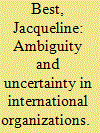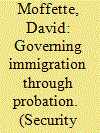| Srl | Item |
| 1 |
ID:
118170


|
|
|
|
|
| Publication |
2012.
|
| Summary/Abstract |
How do international organizations deal with the persistent challenge of uncertainty? The most intuitive answer is through regulation. Yet, rules are not always the best solution in times of uncertainty or in dealing with complex and diverse problems. More ambiguous policies that leave room for interpretation, can often be more functional for an international organization (IO); moreover, ambiguities can also be a source of power-and are therefore often a subject of conflict among institutional actors. Focusing on the case of International Monetary Fund conditionality policy, this article provides several key insights into IO practices. It provides an account of the different forms that ambiguity can take in international organizations and develops an explanation for why institutional ambiguities appear and persist. Looking inside the IO black box, the study examines how interests, institutional culture, and legitimacy concerns shape actors' support for ambiguity, and how these preferences combine with broader structural factors to produce a predisposition toward institutional ambiguity. Finally, this article points toward certain implications of organizations' tendency toward ambiguity, suggesting that this may play an important role in enabling institutional expansion.
|
|
|
|
|
|
|
|
|
|
|
|
|
|
|
|
| 2 |
ID:
132338


|
|
|
|
|
| Publication |
2014.
|
| Summary/Abstract |
Lacking an effective recruitment strategy and wanting to satisfy the demand for immigrant labour, Spanish authorities facilitated the entry of (mostly) Latin American 'tourists' in the early 2000s, knowing that many were migrants entering Spain to reside and work irregularly. This strategy is one of postponing control - a strategy of displacing some of the filtering work performed by borders and immigration selection across space and time. In this context, facilitating entry, policing the streets, regularizing 'deserving immigrants' and deporting 'undesirable foreigners' are analysed as complementary dimensions of a diffuse and flexible regime governing immigration through probation. It is argued that this displacement of borderwork allows for the creation of a probationary period during which the conduct of migrants is scrutinized and policed. This article describes the logics and practices of the various institutional actors involved in governing irregular migration in Spain, while paying attention to the role that discretion and competing interests play in the multi-scalar assessment of migrants' desirability.
|
|
|
|
|
|
|
|
|
|
|
|
|
|
|
|